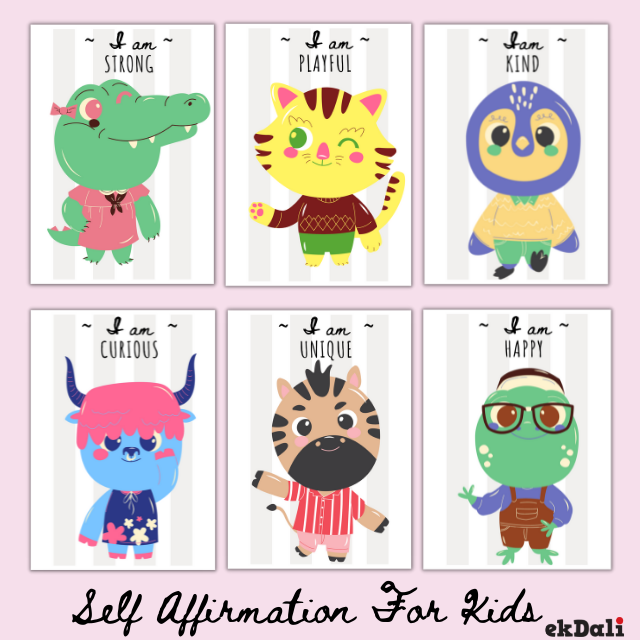Although you may not believe that daily mantras can make a significant impact, using positive affirmations for children can be life-changing!
It is just as essential for parents to encourage, love, and support their children as it is for children to learn to generate happy emotions within themselves by maintaining a positive outlook. It is extremely empowering for a kid to develop feelings of self-worth through positive thinking, making it much more difficult for others to tear them down.
Affirmations are a potent and all-encompassing method of developing a positive mindset and happy children. Nurturing their authentic selves and assisting them in experiencing the wonder of infancy.
What exactly are optimistic affirmations?
Affirmations are positive phrases or statements that you repeat to yourself to counteract negative or unhelpful thoughts. You can use them to motivate yourself, promote positive changes, or increase your self-esteem. If you frequently find yourself engaging in negative self-talk, affirming words can help. To encourage wellbeing, you can train your brain to think in a more positive and beneficial manner.
Simply put, a statement is something you say to yourself. Positive words that are absorbed by the psyche to form your belief system.
Why are positive affirmations essential for children?
This brings us to the next advantage of mantras. They encourage us to use positive self-talk and to be kind to ourselves. We can create a habit of criticising ourselves as we grow, harming our self-confidence and lowering our resilience. Learning positive self-talk from an early age helps children avoid self-criticism because a strong and positive belief system is already in place.
Because bullying is such a huge problem that many children experience at some point in their lives, self-confidence is exactly what will help them deal with these situations. It is critical to maintain an optimistic attitude. When children exhibit anti-social behaviour, this can be extremely challenging. Children who build positive mental pathways are more resilient and self-assured, coping much better than those who have low self-esteem.
Many bullies lack confidence and feel the need to belittle others in order to feel better and more in charge. Children who have a good self-image are less likely to bully others. A short two-minute affirmation at the start of a school day can make a world of difference for troubled children.
As children, we can mould our entire lives by developing inner confidence. Our self-esteem influences every part of our lives. It has an impact on our ability to learn and engage in school, as well as our social and creative abilities, relationships, reaching our goals and aspirations, and, most importantly, our standards. We often lower our standards or'settle' for what we think is achievable when we lack self-confidence.
How to Teach Children Positive Affirmations?
Positive phrases are simple to incorporate into your daily routines and only require a few minutes each day. They can also be used to help children settle and regain focus during a job that requires them to pay attention for long periods of time.
Implementing optimistic self-talk
It is a good idea to teach your children how to use affirmations so that they comprehend what they are for and how they work. Keep it lighthearted and uplifting.
"Affirmations educate you to think in new and positive ways. They can assist you in believing in yourself, feeling joyful, and feeling better when you are angry or sad. Let's give them a shot and see what we think!"
"Affirmations promote positive thinking and will help you recall them when you need them the most."
Another method is to place positive affirmation cards for kids around the home in places where they will see them. Simply reading the sentences will help them confirm their positive beliefs. A good place to start is on the restroom mirror or at the breakfast table.
It will also assist if you set a good example and read the affirmations yourself. You might want to repeat your positive words aloud. You may discover that this gives you the opportunity to discuss feelings or issues that they may be experiencing, thus opening up avenues for discussion. Working together to improve your ideas may just make you shine.
Looking in the mirror
Being comfortable looking in the mirror and learning positive self-talk is one of the most important lessons affirmations provide (talking to yourself with kindness and positivity). Many of us struggle to gaze in the mirror without being critical, judgmental, or negative about ourselves.
Affirmations should be repeated.
Affirmations are more effective when repeated, and it's best to say self-affirming phrases three times, each time saying them louder and with more confidence. This contributes to the belief's confirmation. You can work on one affirmation per day or one per week, based on how comfortable your child is with each one. If they appear to be struggling with one in particular, you may want to work on it for a little longer.
Excellent Tips
You could also spend some time talking about the affirmation and how your kid feels about it. Perhaps make a long list of their qualities to help them gain confidence and identify their values. Some toddlers may prefer to work on the affirmations on their own, which is perfectly fine.
It is critical to respect your kid and their feelings, and not to push them too hard if they are uncomfortable. Self-affirmation should always be introduced in an exciting and fun manner. Use them to encourage children to be the best they can be and to foster happy and positive emotions.
Affirmation cards should never be used for discipline, time out, or any other negative behaviour. Because they are such a valuable instrument, it is critical not to cast them in a negative light.
Checkout our ekdali Affirmation cards and posters specially designed for young kids. Self Affirmation Cards for Kids
























